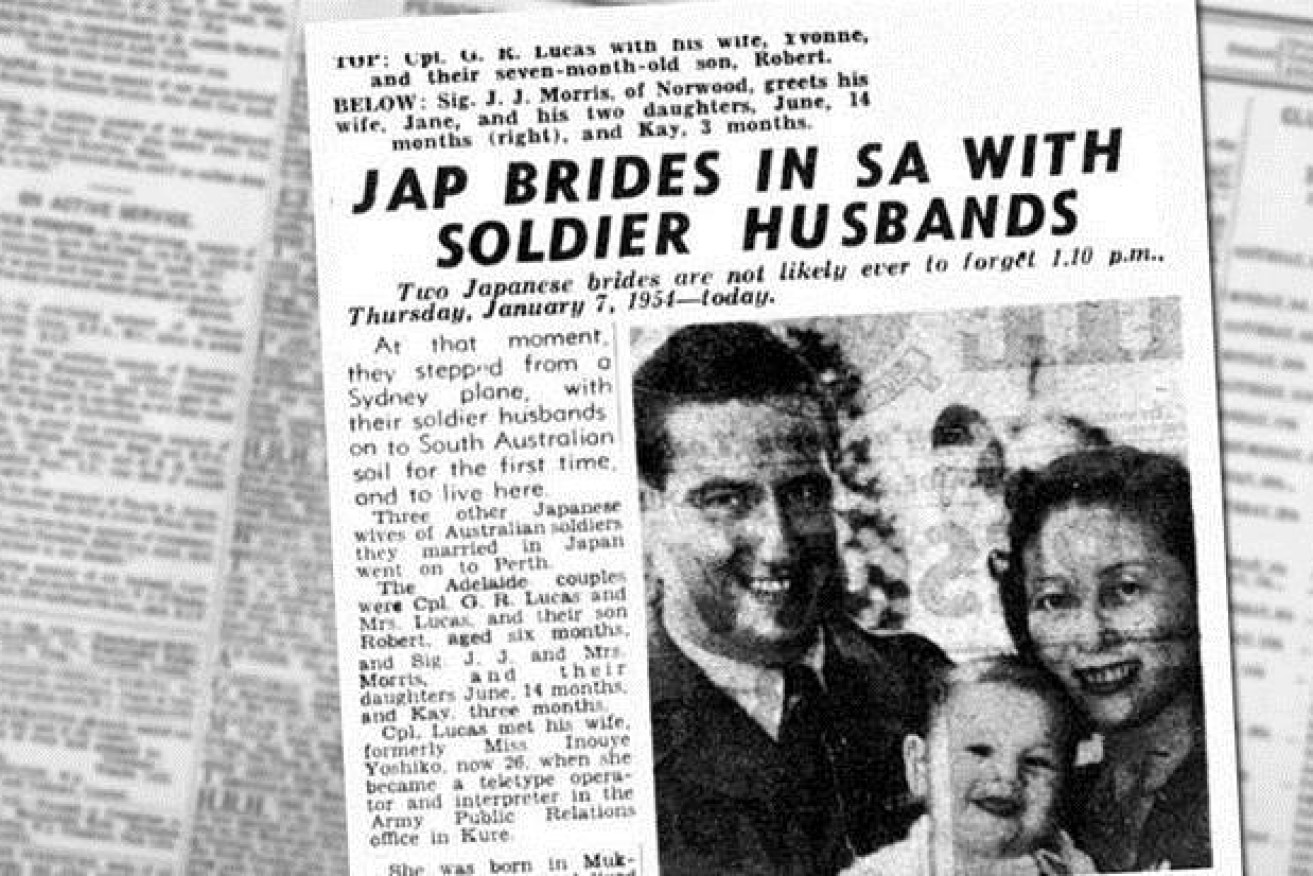Tears flow as Lucas tells of mother’s journey

The local paper records the arrival of "war bride" Yvonne Lucas, with an infant Rob in her arms
In more than 32 years as a Legislative Councillor, Rob Lucas has developed a thick hide.
He’s an old Liberal warhorse who’s seen the highs and lows of political life, from leadership stoushes to election drubbings to the fruits of high office.
But yesterday the old warhorse was moved to tears as he recounted his mother’s painful journey from Japan as a “Japanese war bride” and his own troubled transition to life in 1950s-era Australia.
“As a child, at school I was called a ‘Jap’, a ‘slope’, a ‘slanty-eyed’, a ‘Yellow Peril’, and a variety of other unfavourable descriptors,” Lucas told parliament.
The political veteran’s mother Yvonne passed away late last year aged 87, as her son was overseeing the desperate aftermath of his party’s fruitless campaign in Fisher.
“She was someone whose life story was a magnificent example of how our society has changed over the last 60 years,” Lucas reflected.
The Manchurian-born Yoshiko Inouye married Lucas’s father Bob, becoming one of the first Japanese war brides to emigrate to Australia.
After the atomic bombs decimated Japan at the Second World War’s grim denouement, Lucas recalled, Russian soldiers moved into Manchuria and communist Chinese took control of the major cities.
“At that time the Russian soldiers and the communist Chinese made it difficult for those Japanese nationals who continued to live in Manchuria,” he said.
“All the banks were closed. All the families’ money was frozen so that families such as my mother’s lost everything. For two years my mother’s family survived, given that her father had passed away, by firstly selling all their jewellery, then her mother’s kimonos and, finally, all their furniture. When eventually the Russians and the Chinese agreed that some Japanese nationals could leave Manchuria and return to their homeland of Japan they were told that they could only take whatever belongings they could carry themselves and put in a large pillow sack.”
Yoshiko and her family, including her grandparents, walked for days to the nearest port “carrying their pillow sacks of materials and belongings”.
“They wore as many clothes as they could put on themselves because that meant they did not have to pack them and carry them in their pillow sacks.
“My mother said that her mother carried her husband’s ashes around her neck for the whole journey because the family could not bear to leave him in Manchuria by himself.”
Yoshiko concealed her own ruby ring, a family heirloom “handed down through two generations to her on her 18th birthday”, by wearing gloves throughout the journey “so that the soldiers would not see the jewellery and take it”.
“That family heirloom, the ruby ring, is (still) being passed down through two further generations to the eldest daughter of the eldest daughter in the family,” Lucas revealed.
Lucas’ mother met his father when they both worked in the British Commonwealth Occupied Forces in Japan — Bob was a member of the Australian army serving in Korea, while Yoshiko had a job as a teletypist and interpreter in the offices.
“She changed her name from Yoshiko to Yvonne and when we asked her why, she said the soldiers in the camp either could not or would not be bothered remembering Japanese names,” said Lucas.
“It was too hard for them, so they used to give out the names of Charlie or Doris or ‘whatever it is’ to the Japanese workers. Mum said she did not want to be called ‘Doris’ or ‘whatever it is’, so she chose her own name.”
It was inspired by Yvonne De Carlo, “one of the actresses in one of the black-and-white movies she had seen (whom) she thought looked nice”.
It was difficult to marry, with numerous applications to authorities. Yvonne converted from Buddhism to Catholicism, “because she had to undertake to raise all of the children as ‘good little Catholics’ as was the way in those days”. Lucas’s parents were married thrice: first in the Catholic church, then in the British Consul’s office, and finally in the Japanese city council office.
“Six months after I was born, in December of 1953, my father flew back to Australia having completed his service, but the army would not allow Japanese brides and their children to be flown back with their servicemen,” Lucas revealed.
“They were told they had to hop on the boat to come back to Australia. That boat trip of December 1953 to January 1954, which was over a period of about a month, was the first group of Japanese war brides who came back to Australia.”
Around 30 brides and fiancées, along with 17 children, were on that ship. Yvonne lost 10 pounds “through a combination of sea sickness and morning sickness, as she was not only nursing me but was pregnant with my brother Peter at the time,” said Lucas.
The Advertiser carried the story of their arrival with the less-than-politically correct headline: “Jap brides in SA with soldier husbands”, telling of a day “two Japanese brides are not likely ever to forget”.
They eventually settled in Mount Gambier, where the local paper carried the tale of their first Christmas, with “roast turkey and other good Christmas fare”, along with “an illuminated Christmas tree” which a baby Robert “regarded with solemn eyes”.
Years on, those eyes welled as Lucas recalled all this, prompting a sympathetic Dignity for Disability MLC Kelly Vincent to bring him a tissue.
The speech contrasted his mother’s experience growing into Australian life and celebrating its emerging multicultural bent with “the most disturbing and even more distressing example of blatantly racist material used by the Labor Party against our Liberal candidate, Carolyn Habib, in the state election in the seat of Elder”.
Four Liberal MPs were yesterday named in the Lower House for, as Lucas said, “frankly, calling a spade a spade”.
When a division was called on their expulsion, Liberal young turk Dan van Holst Pellekaan notably left the chamber. Hansard records that he was not paired for the vote. He responded to a call from InDaily with a text message: “If you are calling about my decision regarding voting on the naming motion yesterday, I don’t have any comment to make.”
The atmosphere in the Upper House after Lucas’s recollections was more convivial, with Labor’s acting president and fellow immigrant Tung Ngo calling his ideological nemesis “a credit to your mother, who as an early migrant had to break down a lot of barriers for migrants, or refugees like myself, who came after and were able to enjoy it”.
“I am sure she is very proud of your success,” Ngo concluded.





